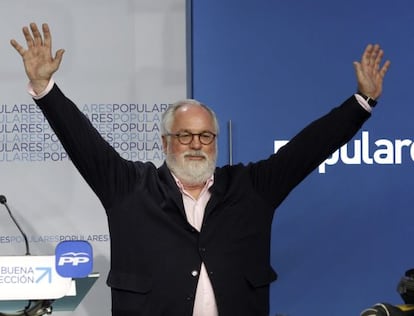Spain’s two-party system dealt major blow in EU elections
Popular Party (PP) and the Socialists (PSOE) fail to attract even 50 percent of the vote But xenophobe and anti-European parties fail to make any headway in Spanish polls


Spain’s two main parties, which have been taking turns in power since 1977, obtained their worst results in democratic history at the European elections on Sunday.
Together, the Popular Party (PP) and the Socialist Party (PSOE) failed to attract even 50 percent of the vote, compared with the 80 percent they garnered at the 2009 EU elections.
This massive loss of support reflects the rapid rise of smaller parties that portray the two main players as being similarly corrupt, beholden to money and unable to effectively deal with the economic crisis.
Despite the fragmentation of the vote, however, no anti-European or xenophobe party has made any headway in Spain, in contrast with other countries such as France, Britain or Greece.
The third-most-voted force in Spain, the United Left, secured just under 10 percent of the vote (six seats), far from the PP’s 26.04 percent (16 seats) and the Socialists’ 23.03 percent (14 seats).
The polls had predicted that the PP and PSOE would attract 65 percent of all votes cast in Spain
But the blow to the two-party system is still much bigger than expected: the polls had predicted that the PP and PSOE would together attract around 65 percent of all votes cast in Spain.
The other big surprise to come out of these elections was the strong performance by Podemos (We Can), a brand new party created in March of this year by a disgruntled Socialist. In just three months, Pablo Iglesias, a 35-year-old university lecturer from Madrid, has managed to attract nearly eight percent of the vote on a platform of change and a low-budget campaign based on TV appearances and the social media. Iglesias, whose team includes a high school teacher, a small-business owner and a scientist, all in their thirties, will get five seats in the European Parliament, rather than the single seat predicted by the polls.
Another minority party created by a former Socialist, Unión Progreso y Democracia (UpyD), gets four seats, two more than last time.
The other big surprise was the strong performance by Podemos, a new party created by a disgruntled Socialist
Meanwhile, Catalonia registered another historical result: for the first time since the Second Republic (1931-1939), the Catalan Republican Left (ERC), normally a minority party, scored a major victory by obtaining the most votes, ahead of the ruling CiU coalition.
The result, together with a much higher voter turnout than in 2009, represents a big show of support for the pro-sovereignty drive led by Catalan premier Artur Mas of CiU, who nevertheless will now have to give his ERC partners more of a voice in the process.
Rajoy and Merkel can boast to be the only leaders of large European countries to win these elections
This, together with the rise of another Catalan party named Ciudadanos, has left both the PP and the Socialists in a weakened position.
Despite the fact that the PP lost 2.6 million votes and eight seats in the European Parliament, its leaders expressed satisfaction at having beaten the Socialists, whose results on Sunday are the worst on record: 2.5 million fewer votes and nine fewer seats.
In fact, Prime Minister Mariano Rajoy can boast to be the only leader of a large European country, together with Germany’s Angela Merkel, to come out the winner of these elections.
“The only goal was to win, and we managed that,” said high-placed PP sources. Secretary general María Dolores de Cospedal said the party was “satisfied,” without mentioning the loss of votes.
Meanwhile, the Socialist candidate to the elections, Elena Valenciano, admitted that theirs has been “a bad result, hard, difficult,” and that the party’s executive committee would be meeting on Monday to discuss what to do next. At stake could be the political future of party leader Alfredo Pérez Rubalcaba.
Tu suscripción se está usando en otro dispositivo
¿Quieres añadir otro usuario a tu suscripción?
Si continúas leyendo en este dispositivo, no se podrá leer en el otro.
FlechaTu suscripción se está usando en otro dispositivo y solo puedes acceder a EL PAÍS desde un dispositivo a la vez.
Si quieres compartir tu cuenta, cambia tu suscripción a la modalidad Premium, así podrás añadir otro usuario. Cada uno accederá con su propia cuenta de email, lo que os permitirá personalizar vuestra experiencia en EL PAÍS.
En el caso de no saber quién está usando tu cuenta, te recomendamos cambiar tu contraseña aquí.
Si decides continuar compartiendo tu cuenta, este mensaje se mostrará en tu dispositivo y en el de la otra persona que está usando tu cuenta de forma indefinida, afectando a tu experiencia de lectura. Puedes consultar aquí los términos y condiciones de la suscripción digital.








































